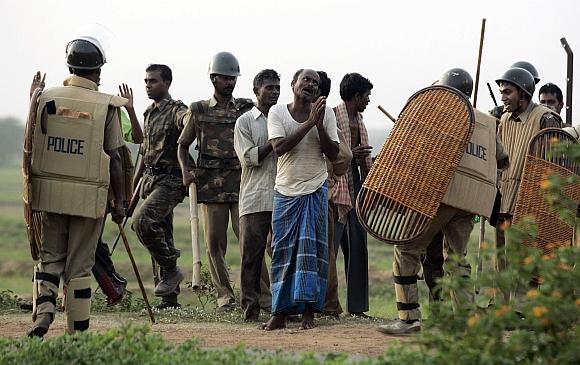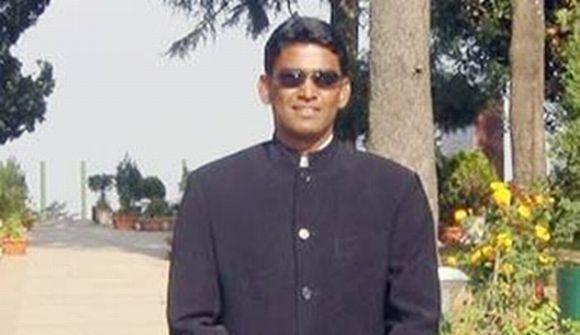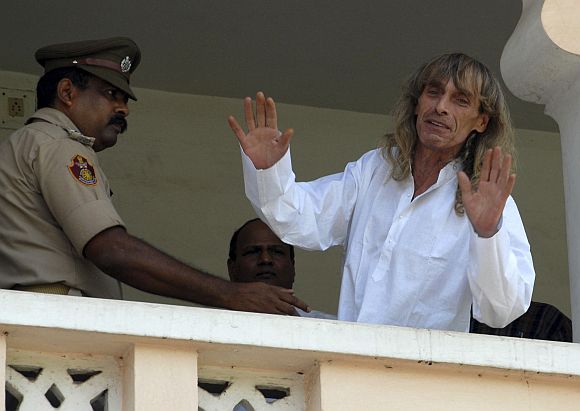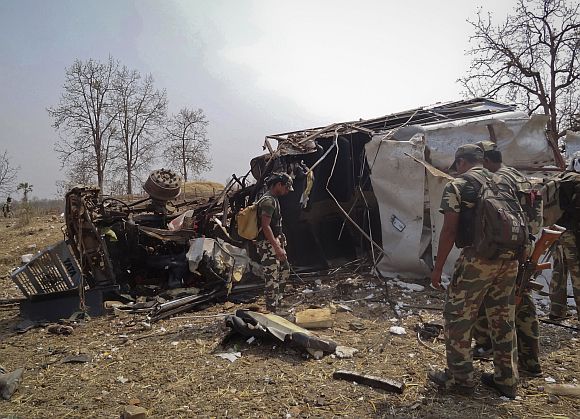Photographs: Jayanta Shaw/Reuters Colonel Anil A Athale (retd)
In over three decades of terrorist violence, points out Colonel Anil A Athale (retd), India does not have many instances of hostages being rescued by special forces.
Our special forces, he says, are competent enough to do it, but the administration lacks the guts to use them.
In 1972 during the Munich Olympics, Palestinian terrorists kidnapped Israeli athletes. Israel refused to negotiate and in the botched rescue attempt by the German security agencies, all the Israeli athletes were killed.
What the Israeli ambassador then said is of relevance even today: 'If we once give in to kidnapping, these will only multiply. In the war against terror, every Israeli citizen is a soldier. Like a soldier, he is ready to sacrifice his life.'
India has been victim of terrorist kidnappings since 1989. That year then Union home minister Mufti Mohammad Sayeed's daughter was kidnapped by Kashmiri terrorists. The government gave into demands and freed a large number of terrorists.
Kashmir thereafter went up in flames and it took nearly a decade and the loss of many lives, both civil and military, to bring the situation under control.
Ten years after that event, we repeated the folly after an Indian Airlines flight was hijacked to Kandhahar, Afghanistan.
Please ...
We continue to negotiate with the kidnappers
Image: Jaish-e-Mohammed founder Masood AzharPhotographs: Reuters
Released Jaish-e-Mohammed terrorist Mazood Azhar went on to help organise the Mumbai train blasts and the 26/11 attacks that killed nearly 300 Indians. Despite this history, we have failed to create a national consensus on the issue.
Despite the dismal past we continue to negotiate with the kidnappers. Our society and media create a frenzy and our citizens refuse to stand up to the terrorists.
A false notion has been propagated that it is the job of only the police and army to fight terrorism.
Instead of a clear national policy we deal with each kidnapping in an episodic response.
The famed 'case by case approach' so favoured by the bureaucrats.
The kidnapping of the district collector of Sukma, Chhattisgarh, seems to have crossed all bounds of common sense.
Please ...
Foolhardiness by senior officials must be punished
Image: Abducted Sukma Collector Alex Paul MenonPhotographs: Courtesy: Facebook
Despite similar incidents in neighbouring Odisha, the collector disregarded the security drill, violated the basic norm of keeping Central Reserve Police Force personnel informed and went on a visit on his own.
The saddest part is that all the media coverage is centred on the wellbeing of the IAS sahib with not a word on his two bodyguards who made the supreme sacrifice to protect this worthy.
In all fairness, the collector ought to be dismissed from service for violating the security norms and causing the death of his bodyguards!
Instead, the media is full of pictures of his anxious family etc. Foolhardiness by senior officials must be punished.
If the collector was a soldier, he certainly would have been court-martialled.
In over three decades of terrorist violence, India does not have many instances of hostages being rescued by special forces. Our special forces are competent enough to do it, but the administration lacks guts to use them.
In addition, there are the ever-present non governmental organisations, NGOs, to question every action of the police/army and the judiciary ever ready to apply the judicial yardstick to operational decisions.
We have failed to realise that operational decisions have to be taken on imperfect information and not foolproof evidence!
Please ...
The Naxal revolt seems to be passing through a violent phase
Image: Freed Italian tour guide Paolo Bosusco, who was taken hostage by the Naxalites in OdishaPhotographs: Reuters
The decision-maker, unlike the judiciary, does not have time on his side. He cannot wait for perfect information or a perfect plan!
The Naxalite revolt in the tribal-dominated central India is a classic case of a 'creeping revolution'. The rebels entered an un-administered area and made it their own. Neglect and political irrelevance even in a democratic State are the main causes.
The most unfortunate consequence of this was that the tribals -- simple forest dwellers -- are caught between two opposing and irresistible forces.
But the original sin was committed when the forests were nationalised and the tribals became refugees in their own habitat.
For a tribal, this is fight for survival.
The Naxals stepped in to exploit the situation, but did not create it.
The Naxal revolt seems to be passing through a violent phase at the moment and the State is yet to drive home the truth that force will not win any concessions.
At the same time, welfare measures including economic development and grant of forest rights to tribals is still a work in progress.
Please ...
Tribals fear modernisation
Image: The wreckage of a police vehicle damaged by a landmine triggered by Naxalites in Gadchiroli, Maharashtra, March 27Photographs: Reuters
But the twin strategy of development and dominating force will, in time to come, produce results.
The new Forest Rights Act of 2006 has rectified the past injustice to some extent. The Scheduled Tribes and Other Traditional Forest Dwellers (Recognition of Forest Rights) Act, 2006 was passed in Parliament on December 13, 2006. The President assented to the bill on December 29, 2006 and the act came into force.
But the real problem for the tribals is the fear of modernisation. While contact with the outside world has given rise to aspirations for modern goods and comforts, the tribals, who are just coming out of the phase of their hunter gatherer civilisation, lack the skills to compete in the modern world.
The Naxalites are skilfully exploiting these primordial emotions.
Inept media management has led to lack of trust between the government and the forest dwellers.
The geographical fact that the Naxal-affected areas do not share an international border (unlike Kashmir) means that external influence will be absent.
In the end that may well prove to be decisive. But is seems that like a Greek tragedy, unless the tribals find enlightened leadership soon, they may well continue on the violent path and bring on untold misery on themselves.
This is based on Counterinsurgency & Quest for Peace by Colonel Anil A Athale (retd), written under the Chhatrapati Shivaji Fellowship at the United Services Institute, Vij Books, New Delhi, 2011.






article